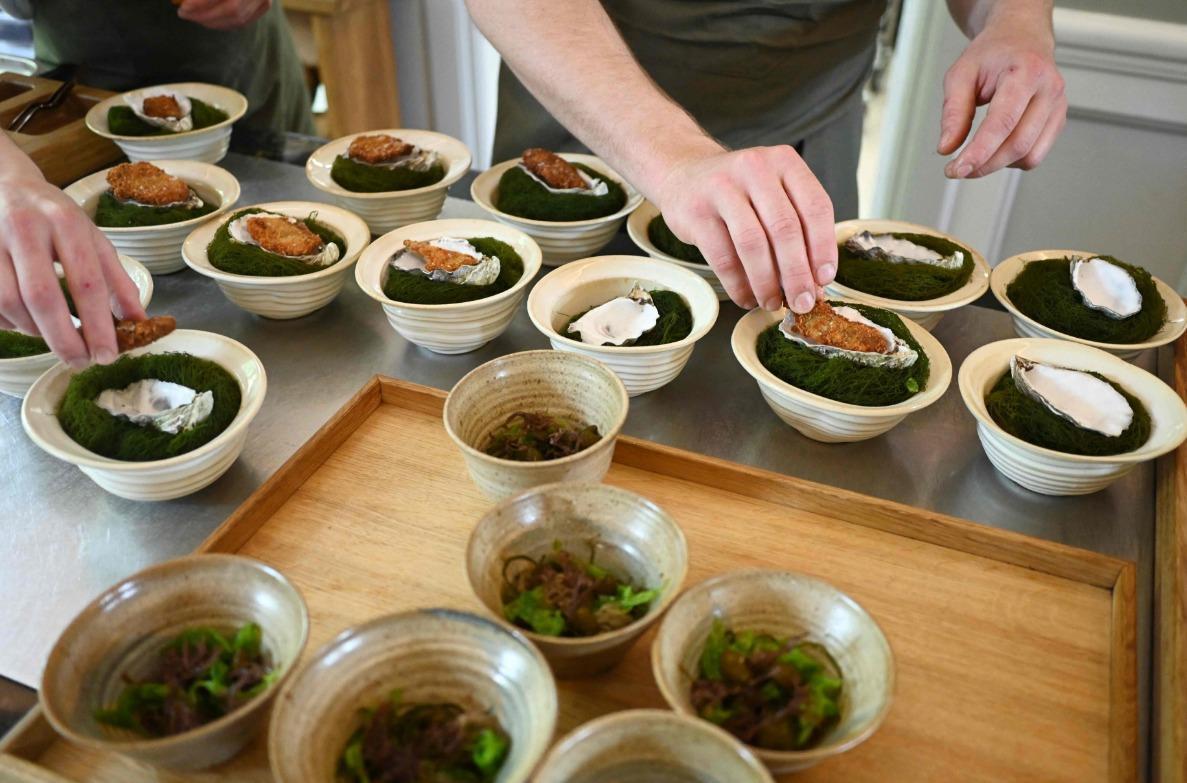Denmark vies to stay gastronomy star
SJÆLLANDS ODDE, Denmark

With off-the-wall dishes like butterfly wings or simple local products, restaurants Denmark, the recent darling of the culinary world, in are outdoing each other to emulate Noma, a soon-shuttering three-starred eatery.
Tucked away at the far end of an industrial zone in an old shipyard, Alchemist is turning food into gold, offering its fortunate-enough visitors - the single set menu costs 4,900 kroner ($707) - a "holistic experience" consisting of 50 "impressions."
"The ambition is to change the world through gastronomy and try to make a very immersive experience by bringing different artistic fields into the culinary world," says Alchemist's 32-year-old chef, Rasmus Munk. And that experience is drawing crowds. Around 10,000 people are usually on the waiting list at Alchemist, which serves 52 people a day.
Behind a heavy bronze door, diners are plunged into an almost mystical ambiance, including music and light effects and a contemporary dance performance.
A first room is reserved for the bite-size amuse-bouches.
Guests then head into "the dome" for the rest of the meal, enjoyed under a cupola screening colorful scenes of ocean life ravaged by plastic pollution, followed by anxiety-inducing news reports.
For one dish, caviar is placed in the pupil of a fake eyeball made from dried cod broth. Here, titillating diners' minds is almost more important than teasing their tastebuds.
"My favorite part is when people begin to debate and create some interaction with the food and experiences," says Munk, whose establishment has two Michelin stars.
Noma, ranked the best restaurant in the world several times, announced in January that it would close for good at the end of 2024 to reinvent itself as a food laboratory.
But Denmark has a long line of restaurants that continue to attract foodie tourists.
On June 11, five new eateries were awarded their first Michelin stars.
Stars in an old asylum
A hundred kilometers west of Copenhagen, diners can have a completely different gastronomic experience at Mota.
Located in a former psychiatric hospital, the restaurant is quiet, simple and bucolic, and gives pride of place to local products. But despite the tranquil feel, Mota, recently opened by another star of Danish cuisine Claus Henriksen, is "a place where you're allowed to do a lot of crazy things."
Surrounded by an abundant flora and fauna offering up mushrooms, asparagus, algae and hake, Henriksen picks what he can from his nearby surroundings to compose his menus.
"Twenty years ago we did a lot of classic French, Italian cooking... We forgot our own products," says the 42-year-old chef. Even the wine menu features local bottles, which are gaining renown amid Europe's warming climate.
The focus on local Nordic flavors and ethical cuisine, a movement started by Noma founder Rene Redzepi, has enabled restaurateurs to reinvent Scandinavian cooking, and reap the financial benefits.
Almost 40 percent of recent tourists to Copenhagen said they visited for the cuisine.
Henriksen said he spent two "wonderful" years working in Redzepi's kitchen.
"There was a creativity. It was also a place where you could find your different ways of being, there (was) an important way of looking at products," he recalled.
Putting Denmark on the culinary map, Noma also attracted young chefs from around the world to the small windswept country.
Long gone are Denmark's days of boiled potatoes, pork chops and gravy.
In their place is a plethora of refined dishes topped with Nordic berries and edible flowers.
"I could watch it developing, getting more people more and more interested," says Louise Bannon, an Irish former chief pastry chef at Noma and now a baker in vogue in Denmark.
"People have travelled all over the world to go and work there and to go eat there," she notes.
During her years at Noma, she developed a hankering for bread baking.
After months spent travelling and training to hone her skills, she returned to Denmark and now makes her bread solely with flour milled locally, including her own.
She says her customers, many of whom own vacation homes at the tip of a wild peninsula, are connoisseurs who can tell the difference.
"People here really appreciate the quality. If you're using fresh flour, they know... they can taste it and they will pay for the quality."
















